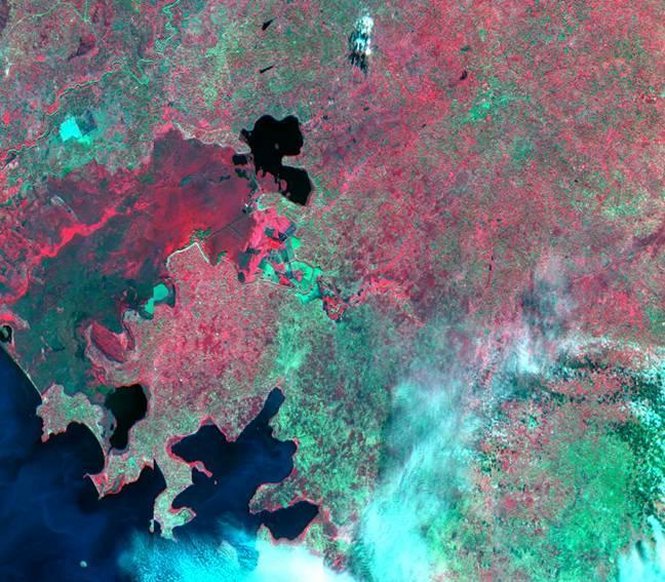[/caption]
Outside of the scientific understanding of our Universe that comes from being a spacefaring civilization, there are many benefits to our continued presence in space. Satellites, besides their obvious benefits like research and communication, also can help keep an eye on the Earth, and are valuable tools in case of disasters such as hurricanes and floods. In other words, satellites can save lives, not to mention allow you to find your own house using Google Earth.
NASA and U.S. Agency for International Development (USAID) recently announced that they will be putting the tool of satellite monitoring in the hands of African countries, giving them previously inaccessible information related to floods, climate change, and other large-scale environmental factors.
NASA and USAID recently unveiled SERVIR-Africa (servir being the Spanish word for “to serve”) in Africa, a monitoring system that provides satellite imaging of the continent using existing United States satellite missions. The project has been in use in southern Mexico, Central America, and the Caribbean since 2005 (thus the Spanish namesake, I’m guessing).
Dan Irwin, SERVIR project director at NASA’s Marshall Space Flight Center in Huntsville, Ala said, “SERVIR-Africa will benefit from the breadth and depth of valuable NASA Earth science satellite and model analyses. Science and technology are key, but ultimately it is the combination of local knowledge along with space-based observations that makes real time monitoring of Africa’s environment effective.”
SERVIR-Africa will provide satellite imaging via the internet to the Regional Center for Mapping of Resources for Development in Nairobi, Kenya. The center is an intergovernmental organization comprised of 15 member states in eastern and southern Africa and is already a pioneer in geospatial mapping in the region.
Data acquired from NASA’s satellites will help predict whether regions of the country are flood-prone, and map regions hit by floods to aid in rescue and cleanup efforts. It’s also possible to create an early-warning tool to predict the spread of vector-borne diseases such as Rift Valley Fever, and monitor climate change on the continent to better understand impacts on many of Africa’s diverse ecosystems. Satellite information will also be used to track urbanization, create more accurate maps and more efficiently manage natural resources.
Better information on climate and flooding will likely translate to the reduction of famine due to poor crops, and will aid in the preservation of already-damaged ecosystems in Africa.
In addition to these long-term benefits, African countries will be better equipped when responding to immediate disasters. SERVIR provided real-time data that led to warnings for specific regions in Panama when heavy rainfall caused large landslides in November 2006, and currently monitors the Alantic ocean for potential hurricanes.
Source: NASA


It seems these days that anytime we need to justify some expensive and dubious space project, attaching the words ‘climate change’ seems to make it all worthwhile. Even after all the climate change alarmists get proven wrong again and again.
Dimes to donuts this is nothing more than a very expensive spy satellite – which is fine with me!
‘Climate change’ (whether you believe in it or not) is politically correct, these days. It’s not the first time people attached everything they could to the new buzz word.
But ‘spy satellites’ need no such explanation or cover. They get launched without fanfare, excuses or explanations. Period.
This is far from a dubious space project. We are actually providing information that impacts the decision making on the ground.
Africa is certainly affected by climate change. Floods and wildfires are intensifying every year. But we are certainly not immune from similar disasters. I wish we could do more to provide support during emergencies (and using spy satellites is also fine with me)
http://blog.geobliki.com/2008/11/24/workflow-technology-to-benefit-africa
http://blog.geobliki.com/2008/11/24/la-freeway-fire
_
_
!
+
.
joy_ap_!
satelite reader_!_ manila _philippine_ !
Climate change? Hah! What rot.
I hope that someone in Africa can actually download the data from that satellite. They didn’t even get a decent picture of the last big meteor that came their way.
Hmmmmm………..
I’d like to think that this is a very good (potentially) way of looking out for our neighbours welfare.
howver, cynical old sod that I am, I think the term ‘looking out for’ should be replaced with ‘checking up on’.
Oh well…………..
hjkjk